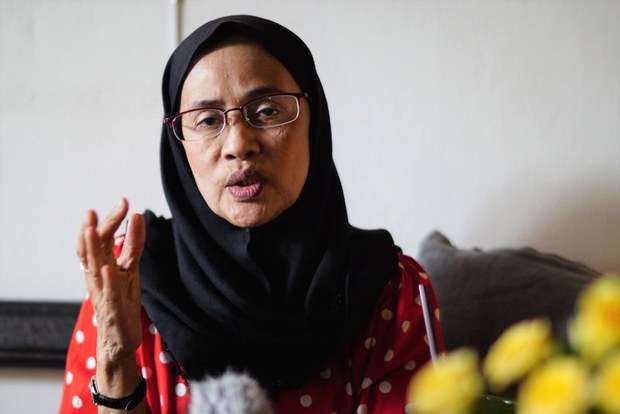Thai PM Defends Directive to Gather Data on Muslim Students
2019.09.17
Bangkok
 Angkhana Neelapaijit, a former member of Thailand’s National Human Rights Commission, speaks to BenarNews during an interview in Bangkok, Sept. 17, 2019.
Angkhana Neelapaijit, a former member of Thailand’s National Human Rights Commission, speaks to BenarNews during an interview in Bangkok, Sept. 17, 2019.
Thai Prime Minister Chan-o-cha on Tuesday defended a police order requiring a university to report on the identities and activities of Muslim students enrolled there.
Police needed such information for investigations and to build up a security database, Prayuth told reporters in Bangkok as he fielded questions about the police order.
“We have to admit that sometimes we cannot examine or conduct something because of a lack of a database,” Prayuth said. “The move is not violating anybody’s rights. Please understand why officials need to do this. Innocents cannot be arrested.”
The police order was brought to light by Angkhana Neelapaijit, a former member of the National Human Rights Commission, who posted a copy of the police order on her Facebook page.
The name of the university was blacked out, and it was not immediately clear if the same order was sent to other institutions.
Among their questions for university administrators, police wanted to know how many Muslim students were enrolled, which “sect” they belonged to, whether Muslim clubs were active on campus, and the names of club presidents, according to the letter seen by BenarNews.
Col. Krishna Pattanacharoen, a deputy spokesman for the national police, said the letter was sent out by its special branch and intended for “building a database and managing intelligence about situations, persons and groups of person within its jurisdiction.”
Yincheep Atchanont, program manager for the Thai civil society group iLaw, said authorities had “no legal grounds” to enforce such an order and were acting as if a junta were still in power.
“There is no law [that] provides them powers to ask for profiles of each student, whether it is related to religion or anything,” Yincheep told BenarNews in Washington.
“This is kind of [a] normal practice when they are in power for more than five years and they feel that they can do anything,” Yincheep said, referring to the junta that led Thailand from May 2014 until June, and whose chief is now the elected prime minister.
Angkhana: ‘My role was limited’
Angkhana, who was awarded the prestigious Ramon Magsaysay Award this month for her work championing human rights in Thailand, told BenarNews in an interview Tuesday that she stepped down from the National Human Rights Commission in July because she was unable to make an impact while working there.
“I resigned because my role was limited and I had no independence,” she said, alleging that a senior commissioner had discouraged her from examining rights abuses in the Deep South.
Angkhana has been vocal about alleged rights abuses in the mainly Muslim southern border region, which has been in the grips of a separatist insurgency and under military rule for decades.
She became an activist after her husband, attorney Somchai Neelapaijit, was abducted from a street in Bangkok in 2004. He had been handling a criminal case on behalf of a group of Muslims from the Deep South at the time of his disappearance, and has been missing ever since.
Angkhana called on authorities to take advantage of technological advances in forensics to help solve cases, saying she had received over 100 complaints of torture of detainees in military custody from December 2016 to May 2017.
“Nowadays, security units have advanced technology [and] forensic science, and if they used these to solve the cases or make an arrest, they would gain trust from people,” she told Benar.
Last month, a 34-year-old suspected insurgent died in custody after weeks in a coma. He was found unconscious in his cell shortly after being taken for interrogation at an army camp in Pattani province.
Thai authorities deny allegations of torture; military officials said that closed-circuit cameras were not online during the questioning.
Wilawan Watcharasakwet in Bangkok and Imran Vittachi in Washington contributed to this report.







